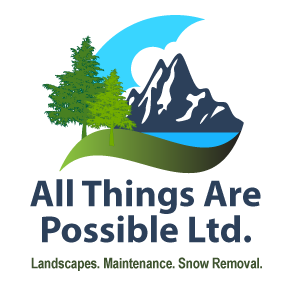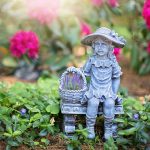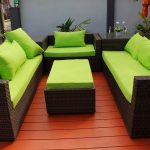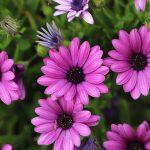Growing an herb garden starts by correctly plotting out where to plant the herbs. It’s important that they’re positioned to receive the appropriate amount of water and sunlight. Additionally, you want to ensure they have enough room to grow.
Herbs thrive in lots of sunlight, so be sure you plant them in an area that receives full sun, meaning sun throughout the d ay. The only exception here is if you live in a particularly hot, sunny environment. In that case, some afternoon shade can help protect them from scorching and drying out. You’ll get the biggest and best results if you plant your herb garden directly in the ground. This gives the roots plenty of room to grow and draw nutrients. But, potted herbs can also be a success. Just be sure to use a large pot for the best results. Mint is one herb that’s best kept in a pot. It’s rampant in its growth and can take over an entire garden if planted directly in the soil.It’s a good idea to position the herbs at least two to three feet away from each other to allow them maximum space to grow over time.
Caring for the soil in your herb garden
Once you have your garden bed selected and an idea of where you’ll place the plants, it’s time to prepare the soil.
· You want the soil to be rich and loose so it drains well. When herbs sit in too much water, it chokes their growth. If you’re starting your garden in a bed of hard clay, you’ll have to till the soil. Use a tiller with sharp tiller tines to get down several inches into the dirt.
· Water your herb garden regularly. To ensure your herbs reach their full potential, check the soil every couple days to see if it feels dry. This is more effective than simply putting out a sprinkler on a regular basis. You need to know how your soil drains to avoid over- or under-watering.
· As a general rule, herbs don’t require much in terms of fertilizing or feeding. The best nutrient you can add to the soil if you want to fortify it is some compost or organic fertilizer.
How to harvest your herbs
So, now that your herbs are in the ground and growing, what’s the best way to harvest leaves from them? With some plants, you may be afraid of pruning them too often, but herbs actually need to be regularly trimmed. And, it’s as simple as taking pruning shears and cutting off what you need. This not only lets you use them as needed, but also helps promote their growth and keep them healthy.
To prune your plants, wait for them to grow almost eight inches high. Then, you can clip as much as you need. If you choose to trim most of the plant, be sure to leave several leaves that can continue to soak up the sunlight and help the plant bloom again. If you only need a few leaves or sprigs, you can trim just a little off.
Nurturing your herb garden through the winter
If you live in a climate with a finite growing season, you may be wondering what to do with your herbs when the weather turns colder. Most herbs can be brought indoors during winter months and kept alive so long as they are located on or near a windowsill that receives a lot of light. There are some herbs that will survive outside through the winter and bloom again in the spring. These perennial herbs include lavender, mint, sage and thyme. Some herbs, such as basil and rosemary can be brought in for the winter, but you should take extra care as they can be a bit delicate and may not last inside.
Find more tips for caring for your garden
Growing the herb garden you want just takes a little time and attention. It also doesn’t hurt to have the right tools. A good tiller will come in handy each season when you want to turn over the soil to improve drainage and nutrients. Visit your local garden centre to find the tools and seeds/plants you need, and always ask for advice. Thankfully, they are open year round, which is your best advantage.







